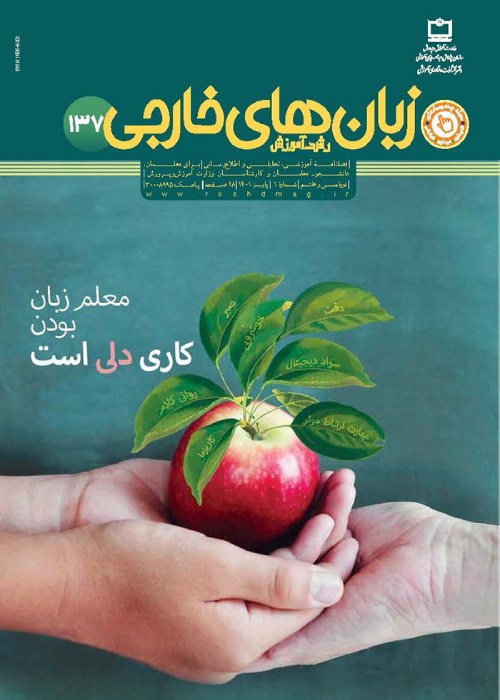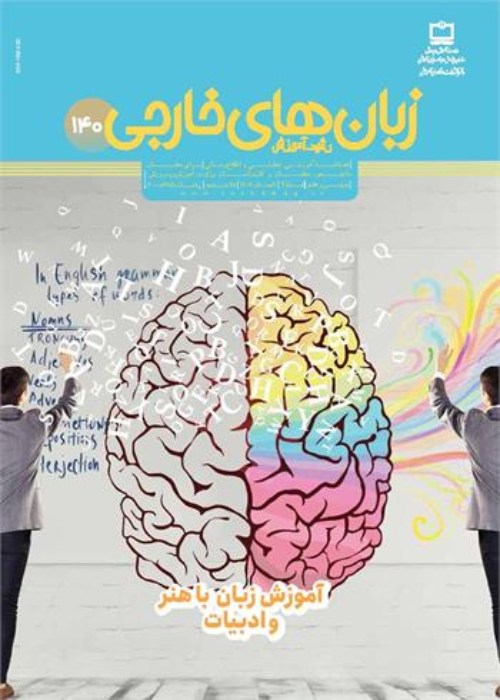فهرست مطالب

نشریه رشد آموزش زبان های خارجی
پیاپی 137 (پاییز 1401)
- تاریخ انتشار: 1401/12/14
- تعداد عناوین: 12
- سخن سردبیر
-
صفحات 2-3
- گزارش، مصاحبه، رویداد
-
صفحات 4-8
- یادگیری دیجیتال
- معلم خلاق
-
صفحات 15-19
-
Pages 1-5
teaching? How do you perceive your own status, commitments, roles, values, beliefs, emotions, and actions in the field of language teaching? How do people perceive you in your profession? Which challenges do you usually face in language instruction? What do you do to develop professionally? Answers to these questions, among many others, reflect the self-images and perceived roles that constitute Teachers’ Professional Identity (TPI). Since enhancing and transforming teachers’ professional identity is believed to be the cornerstone of teachers’ professional development, this article briefly introduces the concept of TPI. More specifically, considering the widespread use of educational technology, especially in the pandemic era, in this article, TPI is pictured as informed by the characteristics of Computer Assisted Language Learning (CALL) among Iranian teachers, and some suggestions are provided to help teachers empower themselves in this field.
Keywords: language teachers’ professional identity, English language teaching, computerassisted language learning, challeges, teaching -
Pages 6-10
Though foreign language is a common subject matter in all public and academic education programs, teaching it is not similar to teaching other subject matters due to the fact that the foreign language itself is the medium of instruction and communication rather than learners’ first language. As a result, foreign language teaching becomes a challenging attempt compared to other subject matters. The present paper tries to discuss some of these less cited challenges and suggest solutions for them based on research. Specifically, four main challenges related to the issues of language proficiency, learners’ accent, the teaching of foreign language culture, and professional development are highlighted and discussed.
Keywords: foreign language, language culture, professional development, languageproficiency, learners’ accent -
Pages 11-18
The Covid-19 pandemic changed education in general and EFL teaching and learning in particular in most countries. Many schools adopted online classes to cope with the crisis. This study aims to identify the challenges of online classes and their impact on teachers’ and students’ perceptions. It also examines the effects of these changes on the teachers’ professional development. To this end, a quantitative method was used. The data was collected by administering two questionnaires to 51 high school teachers and 100 high school students in Isfahan. This study also examines the effect of the challenges of online classes on English language teachers’ professional development to cope with the crisis. The analysis of the data revealed that online education exerted negative effects on participants’ attitudes toward different issues such as online classes and assessment, technology competence, and interactivity rate. The results also revealed the positive effects of online classes’ challenges on teachers’ professional development and innovative capacity.
Keywords: online classes, EFL teachers, learners, perceptions, educationalchallenges, teacher professional development -
Pages 19-22
During the past spring, the schools reopened after about two years of online education. In the new normal post-Covid19 period, both teachers and students are expected to join face-to-face classes and leave the fully virtual classes behind. The students do not anticipate to experience the same traditional education they had received before the outbreak of Covid19. On the one hand, the students complain about how painful it is to abruptly get detached from their smartphones. On the other hand, the teachers find it awkward to teach without digital tools and technologymediated resources. In this changing educational context, teachers need to adapt their pedagogical orientations to the current learning landscape in which they need to selectively and systematically integrate technology into their conventional classroombased instruction. The present article comprehensively introduces the concept of blended learning as an environment which still has application in the post-pandemic era and offers practical tips for effective language education via blended classrooms.
Keywords: blended learning, conventional classroom-based instruction, smartphones, online education, virtual classes -
Pages 23-25
One of the defining features of successful language teachers is their ability to effectively teach different language skills and sub-skills, especially those that are either difficult to be effectively taught or complicated for students to gain grasp of. One such sub-skills is language structure, namely grammar. Language structure is one of the highlights of English coursebooks in Iran and is usually taught deductively by expressing the grammatical rules and having students practice them in different types of exercises. In effect, language structure practice is not a favored language sub-skill for many learners as they do not find the instruction and practice engaging. Digital technologies, namely online comic strip generators provide language teachers with opportunities to insert some dose of creativity and fun into instructional content created for grammar instruction and practice, making the learning process more engaging for students. This mini-article introduces a two highly practical comic strip generators and reviews their application for creating grammar instruction content.
Keywords: language structure, comic strip generator, grammar, successful languageteacher, digital technologies -
Pages 26-27


